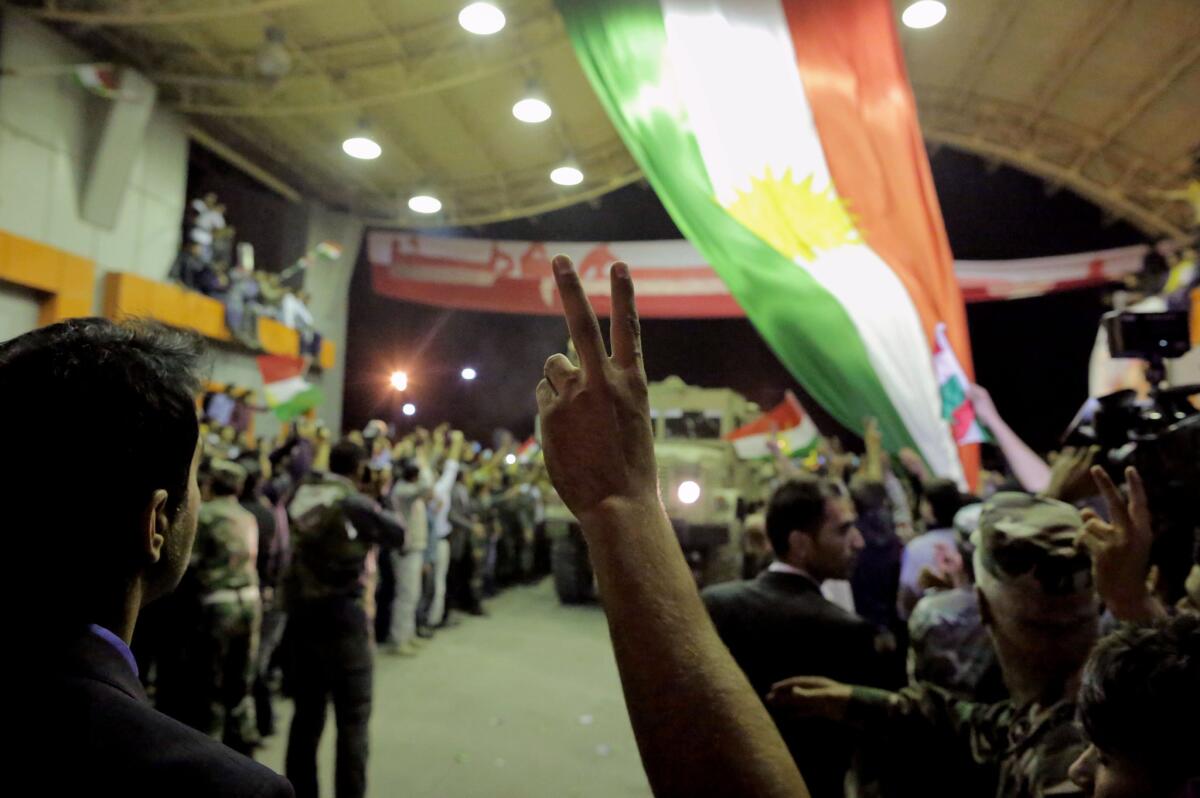Iraqi Kurdish fighters head to Kobani to take on Islamic State

- Share via
Reporting from Mursitpinar, Turkey — Some rebel reinforcements reached the besieged Syrian city of Kobani, officials said Wednesday. But the main force of fighters from Iraqi Kurdistan, aiming to help fellow Kurds battle Islamic State militants, was said to be still en route as night fell.
Defenders of the border town just yards from the frontier with Turkey are backed by a campaign of U.S.-led airstrikes, lending Kobani heavy symbolic weight in the West’s confrontation with the extremist group Islamic State. The militants hold sway over large parts of Iraq and Syria and have enforced their rule with atrocities, including beheadings, crucifixions and sexual slavery.
On Wednesday, warplanes roared over the city, high above crowds on the Turkish side waiting for the arrival of the Iraqi Kurdish fighters, or peshmerga. A column of smoke could be seen rising from the city.
Officials reported the arrival of dozens of rebel fighters from the pro-Western Free Syrian Army, but their role in the city’s defense was not immediately clear.
Near Mursitpinar, close by the Turkish frontier, men and women gathered on roadsides and hilltops, some scanning the terrain with binoculars, hoping for a glimpse of the peshmerga forces. Kurdish flags fluttered, and a festival-like atmosphere prevailed, despite the sound of occasional gunfire from across the border in Kobani.
“The peshmerga are welcome -- they will help us get the Islamic State out of our lands,” said 46-year-old Fatma Sheikh, sitting on a hill overlooking Kobani. She was wearing a headscarf in the Kurdish colors.
Esmat Sheikh, a political representative of the People’s Protection Units, the ethnic Kurdish faction commonly known as the YPG which is defending Kobani, said by telephone that the peshmerga “are on the way, but they haven’t come in yet.” He said the approximately 50 Free Syrian Army fighters who had arrived were from Kurdish-majority brigades.
A contingent of 150 peshmerga fighters landed earlier Wednesday at Ruha airport in the southern Turkish city of Urfa, 30 miles northeast of Kobani, before making their way with Turkish army and police escorts toward the border with Syria, according to Turkey’s official Anatolia news agency.
Another 40-vehicle convoy carrying fighters and weaponry traveled overland via the Habur border crossing in southeast Turkey. Local Kurdish news outlets showed footage of hundreds of Kurds cheering the convoy as it passed through Kurdish-majority towns between Iraq and Turkey.
Halgurd Hekmat, spokesman for the Iraqi Kurdish ministry responsible for the peshmerga, told the French news agency Agence France-Presse that the fighters would serve as support forces. They were armed with automatic weapons, mortars and rocket launchers, Hekmat said.
Kobani has been the site of intense clashes since September between the Sunni Muslim extremists of Islamic State and Kurdish fighters affiliated with the YPG. About 800 people have been killed in six weeks of fighting, and some 200,000 have fled.
The battle has posed a quandary for the Turkish government. Turkey, a NATO ally, has frustrated Western officials with seemingly halfhearted support for the coalition confronting Islamic State. Many Kurds also accuse Ankara of giving tacit, if not active support to the extremist group – a charge that Turkey has forcefully denied.
“There is no evidence that Turkey has any link, any cooperation, any support to this type of group,” Turkish Prime Minister Ahmet Davutoglu told the BBC on Tuesday.
Turkey has demanded that international action in Syria be directed at toppling Syrian President Bashar Assad, which it describes as a greater threat than Islamic State. The Obama administration has insisted that the main threat lies with the militants.
Turkey is also reluctant to offer military aid to the YPG in Kobani. It views the group as little more than a Syrian proxy for its longtime nemesis, the PKK, or Kurdistan Workers Party. Both Washington and Ankara consider the PKK a terrorist group.
Special correspondents Johnson reported from Mursitpinar and Bulos from Amman, Jordan. Times staff writer Laura King in Cairo contributed to this report.
More to Read
Sign up for Essential California
The most important California stories and recommendations in your inbox every morning.
You may occasionally receive promotional content from the Los Angeles Times.














